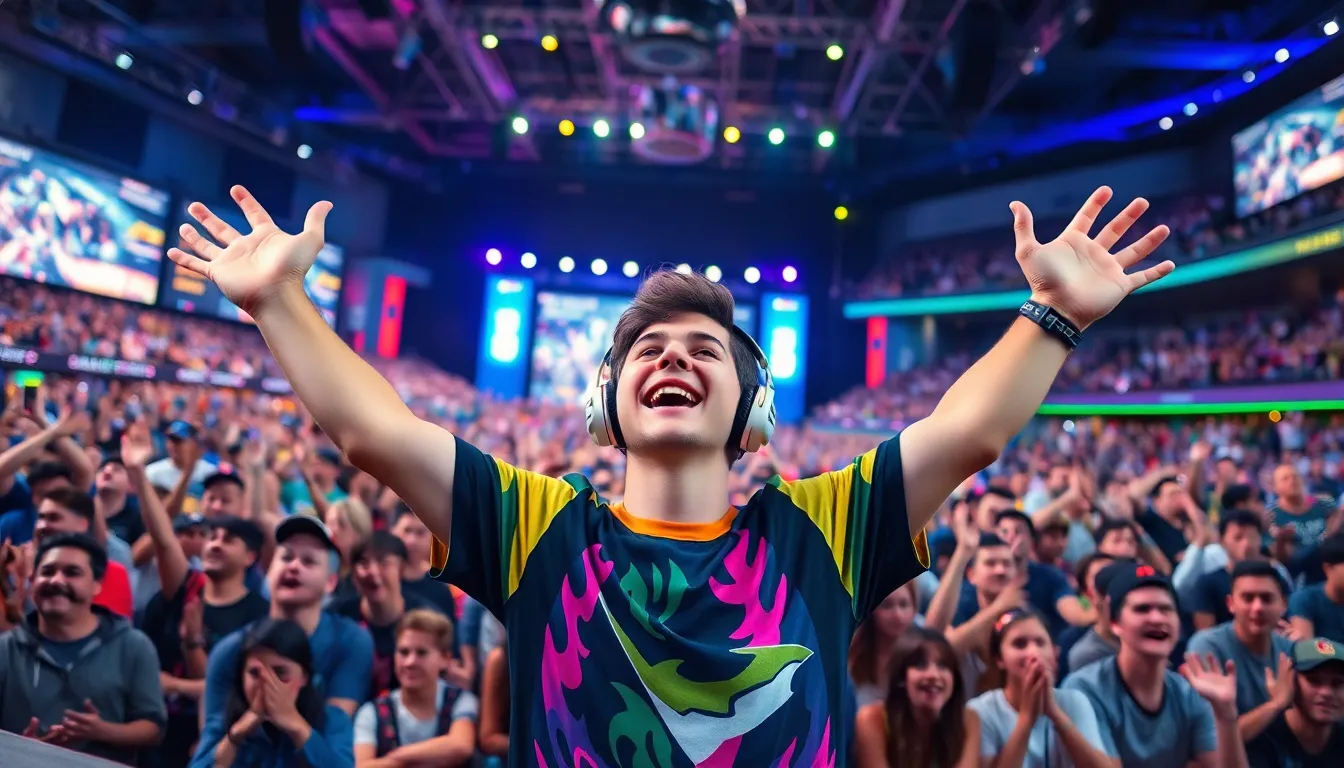Table of Contents
ToggleEsports has exploded into a global phenomenon, captivating millions and turning gamers into household names. Picture this: stadiums packed with enthusiastic fans, jaw-dropping plays that leave everyone on the edge of their seats, and prize pools that could make even a billionaire blush. Major esports events aren’t just competitions; they’re the Super Bowls of the gaming world, where skill meets spectacle and the stakes are sky-high.
Overview of Major Esports Events
Major esports events attract thousands of fans and millions of viewers online. Events like The International for Dota 2 and the League of Legends World Championship showcase top-tier gameplay. They also offer substantial prize pools, sometimes exceeding $35 million. Spectators experience thrilling moments as players compete for glory and recognition.
The growth of these events reflects the increasing popularity of competitive gaming. Audiences engage with live broadcasts, commentary, and analysis, enhancing their viewing experience. Fans often gather at stadiums, creating an electric atmosphere filled with excitement.
The diversity of games represented adds to the richness of major esports events. Titles such as Counter-Strike: Global Offensive, Fortnite, and Overwatch attract unique audiences and players. Each event highlights the distinct skills required for various genres, from first-person shooters to battle royale.
Partnerships with sponsors and major brands have furthered the reach of esports. Companies invest in tournaments, creating opportunities for content creators and athletes alike. Viewership numbers continue to climb, making these events significant in the broader entertainment landscape.
Structured competitions and leagues have emerged, providing consistency in the esports calendar. Each year, fans anticipate events like the Electronic Sports World Cup and ESL One. These tournaments not only celebrate gaming but also foster community and connection among players and fans.
Categories of Major Esports Events

Major esports events fall into distinct categories, showcasing the diverse structure and competitive nature of the industry. These categories enhance the overall experience for players and fans alike.
League-Based Events
League-based events prominently feature regular competitions among professional teams. Structures like the League of Legends Championship Series allow teams to compete over a season, with standings determining playoff qualifications. These leagues foster intense rivalries and provide ongoing entertainment. Well-known franchises develop fan loyalty as they strive for victory each season. Moreover, these events often culminate in grand finals where top teams face off.
Tournament Series
Tournament series involve multiple teams competing in knockout formats. Events such as ESL One often attract international attention, with teams battling through several rounds to win. Each tournament typically has set entry requirements, opening doors for both established and emerging teams. Prize pools in these series can be substantial, sometimes reaching millions. Spectators enjoy the excitement of elimination rounds, contributing to thrilling viewing experiences.
International Championships
International championships represent the pinnacle of esports competitions. Events like The International for Dota 2 and the League of Legends World Championship showcase the best talents from around the globe. These championships not only celebrate top-tier gameplay but also feature enormous prize pools, often exceeding $35 million. Players and teams from various countries participate, leading to cultural exchanges and global fandom. Ultimately, these events highlight the significance of esports on an international stage.
Popular Titles in Esports
Esports features several popular titles that dominate competitive gaming, each with unique gameplay and fan bases. Games like Dota 2 and League of Legends consistently attract large audiences during major events, showcasing elite talent and teamwork.
Dota 2
Dota 2 stands out with its annual championship, The International, known for record-breaking prize pools, often exceeding $35 million. Players engage in five-on-five matches, utilizing diverse heroes with unique abilities. Strategy and teamwork play crucial roles in achieving victory. This game emphasizes both coordination and individual skill, making it popular among professional gamers. Significant viewership accompanies The International, as fans follow their favorite teams and players throughout the tournament, reinforcing Dota 2’s position as a leading esports title.
League of Legends
League of Legends features the World Championship, a highly anticipated event that draws millions of viewers worldwide. Matches typically consist of two teams, utilizing champions with unique skills to destroy their opponent’s Nexus. Competitive leagues, such as the League of Legends Championship Series, provide structured play and cultivate rivalries among teams. Fans engage with the game through live events, streaming platforms, and extensive commentary. The combination of strategic depth and community involvement solidifies League of Legends as a cornerstone in the esports landscape.
Counter-Strike: Global Offensive
Counter-Strike: Global Offensive, often referred to as CS:GO, is a tactical shooter that requires skill and strategy. Major tournaments, like ESL One and the CS:GO Major Championships, attract top teams from around the world. Teams compete in objective-based gameplay, emphasizing teamwork and communication. The ranking system encourages continual improvement among players, fostering a dedicated community. With impressive viewership and significant prize pools, CS:GO remains a foundational title in the esports realm, appealing to both players and spectators alike.
The Impact of Major Esports Events
Major esports events significantly influence various sectors, showcasing not only competitive gaming but also their broader societal impacts.
Economic Contributions
Economic benefits stemming from major esports events are substantial. Cities hosting these events experience increased tourism, with thousands of fans traveling to attend. Jobs in hospitality, event management, and tech support see boosts during competition periods. The global esports market reached approximately $1.5 billion in revenue in 2023, reflecting the financial significance of this industry. Sponsorship deals with leading brands, including Intel and Red Bull, reinforce the economic ecosystem. Prize pools soar, enticing professional gamers and elevating event profiles. Local businesses see spikes in sales during major events, contributing to regional economies.
Community Engagement
Community engagement thrives through major esports events. Fans connect over shared interests, fostering camaraderie and loyalty among diverse demographics. Local events often span beyond gaming, incorporating meet-and-greets, fan zones, and merchandise opportunities. Online platforms enable live interactions during events, allowing fans to engage in real time. Communities develop around popular games such as League of Legends and Dota 2, creating dedicated online spaces. These gatherings provide fans with a sense of belonging, enriching the gaming culture. Initiatives promoting inclusivity and diversity further enhance community ties among players and spectators alike.
Major esports events have transformed the gaming landscape into a vibrant cultural phenomenon. They not only showcase exceptional talent but also foster a sense of community among fans and players alike. The excitement surrounding these competitions elevates gaming to new heights, drawing in millions of viewers and creating a global audience.
As the industry continues to grow, the economic impact becomes increasingly significant. Cities that host these events benefit from tourism and local business growth, further solidifying esports’ place in the entertainment sector. With diverse titles and formats, the future of esports events promises to be even more engaging and inclusive, ensuring that this thrilling spectacle remains a staple in modern entertainment.




